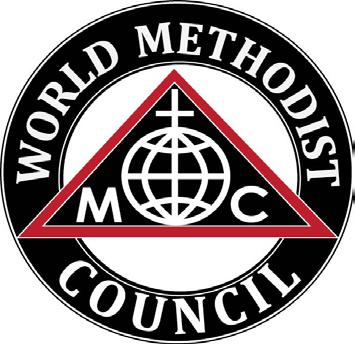

Greetings from the President
Dear Friends,
Greetings in the name of our Lord and Redeemer Jesus Christ. I am grateful for each of you and our shared ministry in the World Methodist Council.
Our World Methodist Council Steering Committee recently returned from an excellent meeting in Accra, Ghana. Many thanks to the Africa Methodist Council under the leadership of its President Bishop the Most Rev. Paul Kwabena Boafo and General Secretary Rev. Dr. Martin Mujinga for showing us radical hospitality throughout our time in Accra. Also, thank you to the Presiding Bishop of the Methodist Church Ghana, Bishop Most Rev. Prof. J. Kwabena Asamoah-Gyadu, Director of Public Relations and Ecumenical Affairs, the Very Rev. Eric Paa Kwesi Amihere and Rev. Hedwig Naa Tolloo Quist for their part in helping organize the week.
Highlights of our time in Ghana included:
- Inspiring worship services on Sunday morning prior to the beginning of the meeting at Accra Wesley Methodist Cathedral, Monday evening at Immanuel Society, Airport East Circuit and Thursday afternoon at Cape Coast Cathedral. The joy of our Ghanian brothers and sisters as they worshipped the Triune God was contagious!
- The 2025 Peace Award dinner and presentation to Dr. Fatou Bensouda in a ceremony at the Wesley Towers building in Accra. Dr. Bensouda’s spirit and courage are inspiring.
- Two and a half days of presentations and dialogues about various aspects of our work together and how they align with our vision of “spreading the gospel and making disciples of Jesus Christ for the transformation of the word.” The spirit of unity and collaboration in our business sessions was a blessing!
- Affirmation of a resource from WesleyMen about the situation in Gaza. This call to prayer and action is a helpful tool to the church as we work to eradicate hunger in general and famine specifically in Gaza.
September
- A visit to The Castle at Cape Coast, the site where for hundreds of years captured Africans were held for two weeks to six months until ushered through “the door of no return” to leave their homeland forever. Following our visit the World Methodist Council Steering Committee provided a press release to the press calling for restorative justice for colonized nations. (Click here to read the Press Release)
- The beauty of God’s creation as we travelled throughout the region. Signs of the magnificent handiwork of our God are in many places on the continent of Africa.
- And so much more.
The in-person Steering Committee culminated our first year of quarterly Zoom meetings. We will continue our meeting pattern of three quarterly Zoom meetings followed by an in-person meeting throughout the remainder of 20252026. Much has been accomplished in the past year in building relationships, planning for the future and sharing the Good News of Jesus Christ in word and deed. There is much more to do in this important work to which we have been called.
I look forward to each of our World Methodist Council meetings on September 11th, 10 am USA/EST or September 12th, 10 pm USA/EST by Zoom for an interactive conversation about some of the ecumenical work which the World Methodist Council is engaged through it’s work of the ecumenical and inter-religious relationships program committee. Members are asked to register for one of the two options as able at https://holston-reg.brtapp.com/WorldMethodistCouncilMeeting
It is a joy to serve as your President. Blessings to you in all that you do.
In Christ,
Bishop Debra Wallace-Padgett President World Methodist Council
Acceptance of the World Methodist Council Peace Award
“Peace is not merely the absence of conflict, but the presence of justice.” – Martin Luther King, Jr.
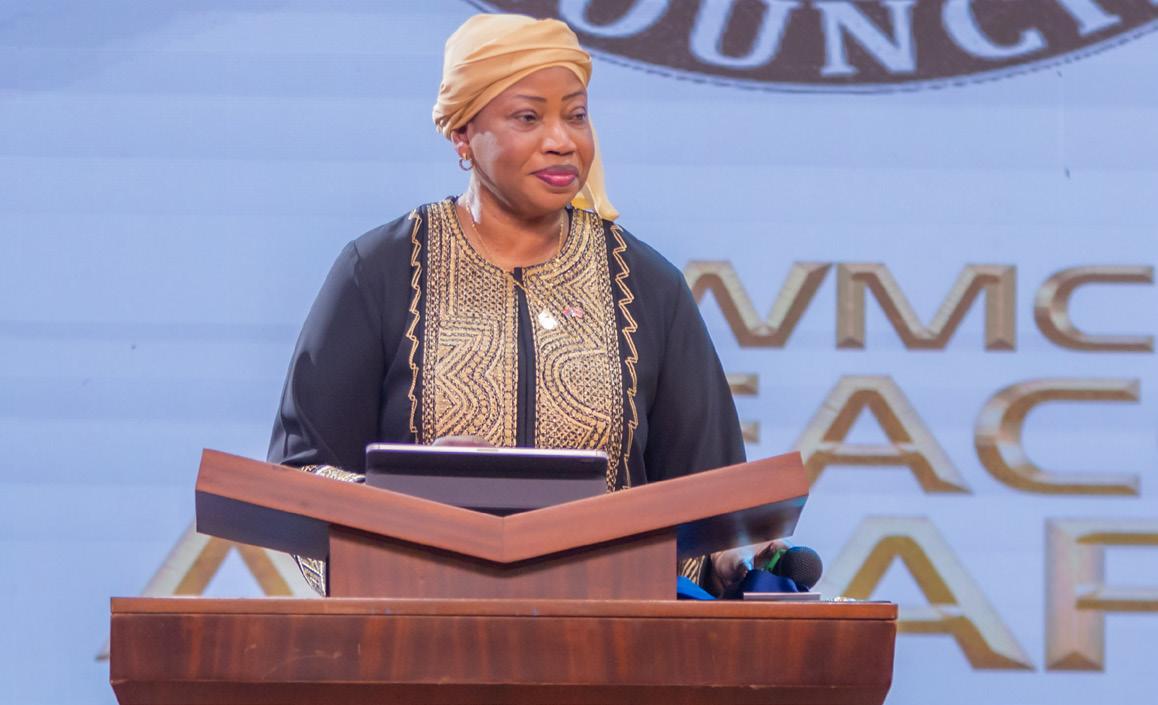
Ceremony.
I accept this award with profound humility, knowing that it carries the hopes of millions who have lived in the shadows of injustice, and who continue to long for peace in a world too often marked by the roar of guns and the silence of accountability.
To receive the World Methodist Council Peace Award is not just a personal honor. It is a sacred trust. And to receive it here—on Ghanaian soil, where the voice of African liberation first broke through the fog of colonialism—is a moment of deep resonance. In this soil lie the memories of Nkrumah, of visionary Pan-Africanism, and of a people who dared to dream beyond borders.
And so tonight, I speak not merely of peace, but of the path to peace: justice.
Peace is not born from silence. Peace is not nurtured by neglect. It is not sustained by sweeping truth under the rug of expediency. Peace is sustained by truth. It is nurtured by law. It is built brick by brick on the foundation of justice.
Justice, when practiced earnestly, is not an obstacle to reconciliation—it is its very heart. It affirms that human dignity cannot be a bargaining chip. It proclaims that there can be no peace unless we are first willing to confront the causes of conflict: impunity, inequality, repression, and exclusion.
Distinguished members, peace without justice is fragile. It is like a glass house in a storm. But justice, even when slow, even when difficult, is the storm’s antidote.
When I reflect on the journey that brought me here—from Banjul to The Hague, from courtrooms to refugee camps—I think not of accolades, but of the voices that have echoed in my heart across decades.
The voice of a mother in Darfur, whose three sons were taken at dawn and never returned.
The eyes of a child soldier in the DRC, who was once forced to carry a gun taller than himself.
The trembling testimony of a young girl in Central Africa, raped by men in uniform who were supposed to protect her.
These are not mere stories. These are sacred truths that strengthened my long term conviction from the courts of The Gambia to now, that justice must give them space. Justice must listen. Justice must act.
As I stand before you today, we find ourselves increasingly confronted with gross and unfettered violations of human rights, total disregard for international law in many conflicts around the world, and threats to multilateralism and the postWorld War Two rules based global order, where unchecked realpolitik calculations reign supreme, and the sanctity of sovereignty is misappropriated in the service of exceptionalism and a rejection of the international rule of law.
We are at a defining moment when some of the most important architects of the Post-WW2 multilateral system are either the very same actors undermining their own creation, still-born, or are being tested on whether their true intentions and positions are driven by principle or rather, shortterm political calculations often at the cost of international law and a rules-based international system.
This reckoning or moment of truth is taking place in the ‘internet age’ where information is instantly available to millions of people around the world, where the truth can no longer be so easily hidden, and naked hypocrisy lays barren for all to see, irrespective of manufactured spin and so called, ‘alternative facts’.
At the International Criminal Court, we built our work on these truths. The court does not chase political advantage.
Continued on next page...
Acceptance of the World Methodist Council Peace Award
continued...
It does not sway with the winds of global power. It listens for the silenced. It acts on behalf of those who cannot act alone.
We prosecuted warlords and commanders. We gave legal voice to the voiceless. And while the work remains unfinished, the mission endures: to make law a sword and a shield—a sword against impunity, and a shield for the innocent.
The ICC is a court of last resort. But for many, it is also a first hope.
Hope that the world sees them.
Hope that truth will be recorded.
Hope that the crimes that shattered their lives will not go unpunished.
But for justice to be truly transformational, it must not remain remote.
It must live in the hearts of national systems. That is why the principle of complementarity is so vital. The ICC does not seek to replace domestic courts. It challenges them to rise. It urges every nation to take ownership of its own justice. To say, boldly: “We will not let impunity define us.”
It is not lost on me that my appointment as Chief Prosecutor was seen as improbable. An African woman, a black woman for that matter, a Muslim woman from a small country, leading a global court?
And yet, I did.
Not as a token. Not as an exception. But as an embodiment of possibility. A reflection of Africa’s depth, and women’s strength, and justice’s reach.
Representation matters. But results matter more.
Read more of H E Dr. Fatou Bensouda 2025 Peace Award Recipients’ Acceptance Speech here.
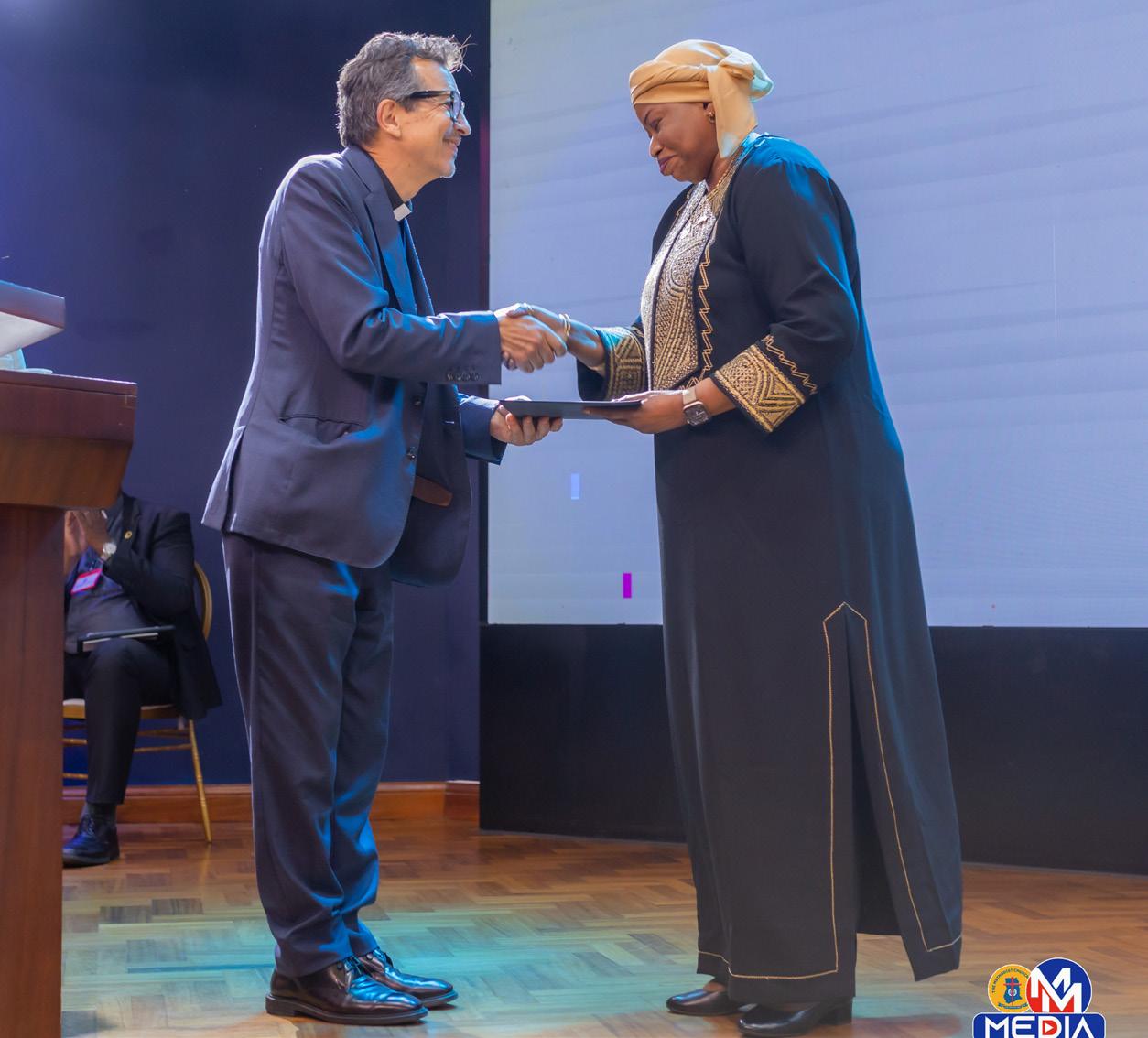
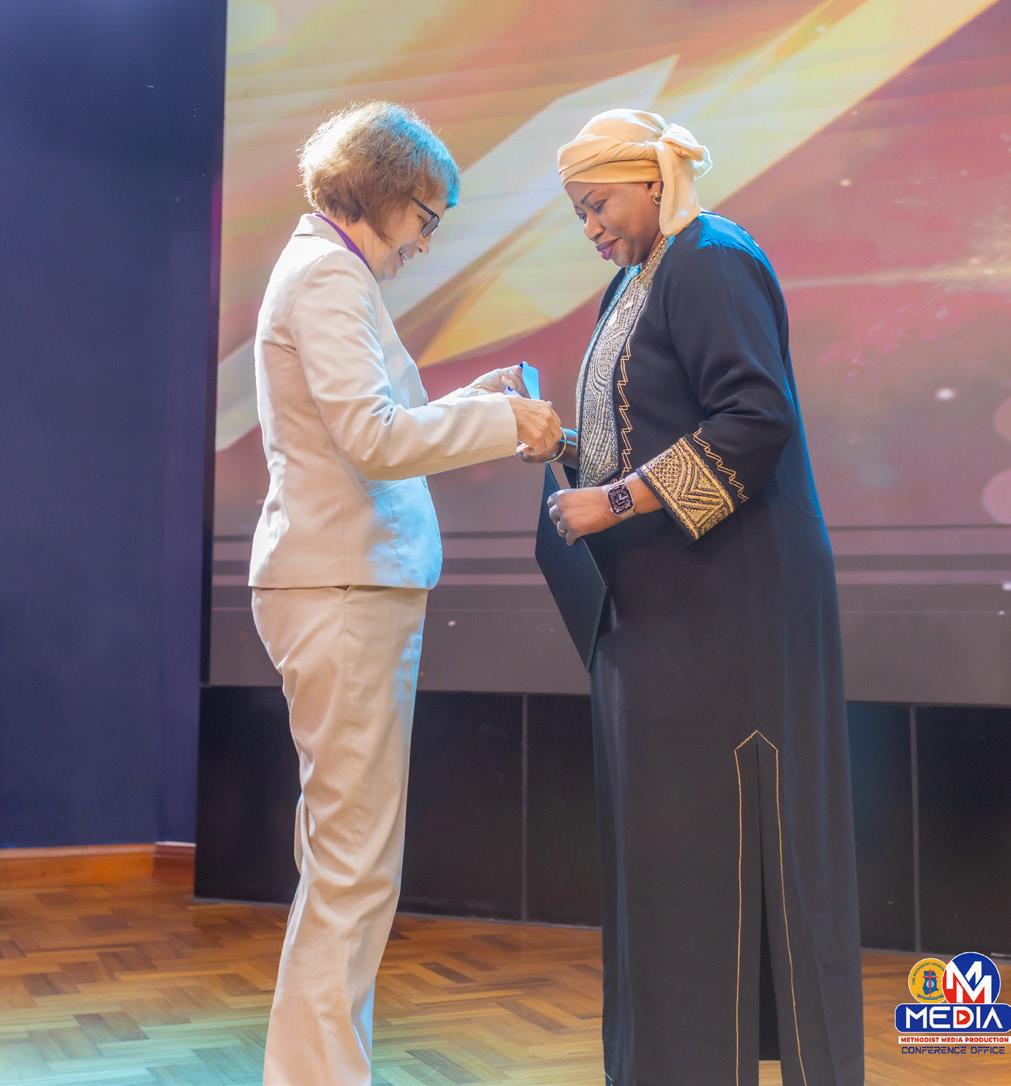
From the General Secretary’s Diary
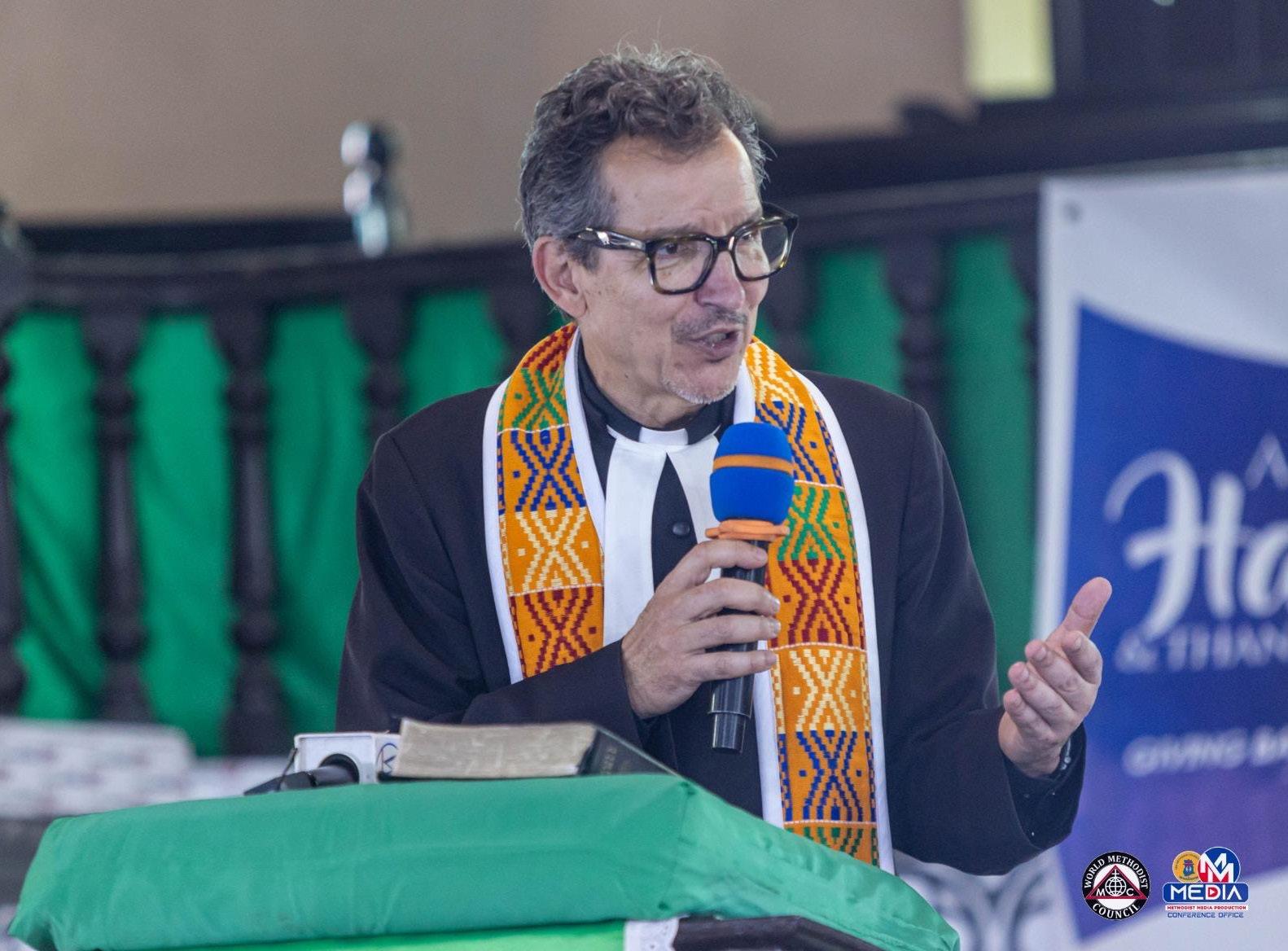
It was a deeply spiritual experience for me to be preaching and sharing in Holy Communion at Wesley Methodist Cathedral in Cape Coast, Ghana. Holy Communion was co-celebrated under the Presidency of The Most Rev Dr Paul Kwabena Boafo, President of the African Methodist Council, with the Bishop of the Methodist Church Ghana Cape Coast Diocese, the Right Rev Richardson Andam, and the WMC President Bishop Debra Wallace-Padgett and myself, amongst other ministers.
The Cathedral was packed full even though the service was a mid-week day time service and had been moved from the evening to early afternoon. The original plan had to be changed as some of the delegates to the Steering Committee had booked flights for the Thursday evening, instead of the departure day, Friday. The transport had to make sure we would be back in Accra by early evening. There was a police escort arranged by the MC Ghana. The local church and circuit were very accommodating. The Methodist people were at the Cathedral in force. The Methodist Classes and Local Church Organisations were present in their uniforms, ready to welcome the WMC visitors from all over the world and ready for worship. This included also a row of pews with the Presbyters sitting together in their clerical
attire. The classes and organisations also sat in rows, distinguished by their uniforms, their songs and chants, their dancing, singing, and offering.
The cruciform building, with a painted wooden interior has a hight pulpit under which early Methodist missionaries are buried. The Holy Communion Table is set in front of the tombs and under the high pulpit. What a setting! I was profoundly moved by the experience of sharing in Holy Communion at the Cathedral in Cape Coast for two reasons, as follows:
Firstly for the sense of fellowship with the first Methodist missionaries to the Gold Coast, West Africa. One of them being the Rev Joseph Dunwell. He was the first Methodist missionary arriving in 1835, sent by the Wesleyan Methodist Missionary Society in London. In those days young men and women went to serve even though they knew there was a great risk of death from disease or other reasons. Dunwell’s ministry was very brief due to an untimely death from malaria, just six months after his arrival. Although short, his ministry laid down the formal foundation for the Methodist Church Ghana. He ministered to both Europeans and Indigenous people, formed classes, Sunday Schools, and gave the first Methodist membership cards to the 50 adherents of the new church. From those groupings, Methodist Societies were created.
Dunwell is the name given to the Ghanaian heritage Church in Telford, England, that was planted and formed under the leadership of the Language Fellowships or also known as the Global Communities Ministry, of which I was the Connexional officer for 5 years until being made the General Secretary of the WMC in 2024. This work was done in partnership with the then, Presiding Bishop of the MC Ghana, the same Bishop Paul Boafo who was presiding over Holy Communion at the Cathedral in Cape Coast. I climbed the high pulpit with my heart full of joy, mindful of all the connections at play in that service. Thanks be to God for the saints below and for the saints above. They are all but one.
A Call to Prayer Against Hunger in Gaza
The Lord’s Prayer, prayed by millions daily, is not merely a devotional formula but a theological manifesto. When we say, “Give us today our daily bread” (Matthew 6:11), we invoke more than just a divine provision, we invoke a vision of economic justice, human dignity, and communal solidarity. This petition “Give us today our daily bread” is one of the most urgent and contextually relevant prayer of the Christian faith. In this simple request, the people of God express dependence on God, a longing for justice, and a commitment to communal well-being. As the World Fellowship of Methodist & Uniting Church Men or WesleyMen of the World Methodist Council commits to combating world hunger over the next five years, this line from the Lord’s Prayer offers a theological foundation and a missional mandate.
As Wesleyans, we understand that the mission of the Church is not just about saving souls, but about participating in God’s holistic, redeeming work in all of creation, establishing justice and righteousness. This involves healing the broken, feeding the hungry, and proclaiming the reign of God through both word and deed. As such, the Church cannot pray “Give us today our daily bread” without becoming an instrument through which that prayer is answered; especially for the marginalized, the displaced and the poor. The Church is invited to view this petition as a call to prayerful action, solidarity, systemic transformation and a commitment to social holiness.
In response to the worsening humanitarian crisis in Gaza, where blocked aid, military siege, and political inaction have left hundreds of thousands, especially children, on the brink of starvation, the WesleyMen calls the worldwide Methodist community to a deeper and more embodied form of prayer. The WesleyMen urges every Christian, every community and every men’s organization to pause every time you pray “Give us today our daily bread” and remember Gaza; her starving children, her grieving mothers, her shattered infrastructure, and the silenced cries.
Why Gaza? Why Now? The situation in Gaza is not merely a political crisis, it is a spiritual scandal. When bread is withheld and humanitarian aid is weaponized, the Church must not be silent!
John Wesley’s own witness compels us to action. His theology of practical divinity, of mercy and justice walking hand in hand, demands that we not only feed the hungry where we can, but also challenge the structures and powers that allow such suffering to persist.
As WesleyMen, we proclaim: starvation is not a punishment—it is an injustice. Children should not
be pawns in war—they are bearers of God’s image. Bread must never be denied—it is a sign of God’s kingdom.
In this invitation to prayer the following words form the petition “Give us today our daily bread” is emphasized:
The plural us/our - The use of the plural pronoun “us” and “our” in the Lord’s Prayer is not accidental. It reflects the communal nature of the Christian faith. There is no “I” in this prayer. There is no individualized faith that seeks private security apart from the collective. This is a collective cry echoing the Wesleyan belief that grace is social in its nature and purpose. John Wesley declared, “The gospel of Jesus Christ knows of no religion but social; no holiness but social holiness.” In this light, the Wesleyan mission understands the relational dimension of salvation as not simply reconciling individuals to God, but reconciling communities to each other, and to creation. This phrase resists the privatization of resources, and the individualization of faith, calling instead for solidarity with the poor, the hungry, and the marginalized. It also reminds us that the children in Gaza are God’s children.
The word “today” and “daily” – The words “today” and “daily” underscore the urgency of the need. Bread is not a luxury for tomorrow it is a necessity for survival today. This aligns with our understanding that theology must speak into the concrete historical moment, not only offering hope for the eschaton but calling for justice in the now. To combat world hunger is to hear the cry of the hungry today; not when it’s convenient, not when it’s politically expedient. The urgency of “today” means we must not spiritualize hunger but confront the systems of exclusion, war and blockage of aid that cause it. Our dependence on God for daily bread implies that bread is God’s gift for all, not a commodity for the privileged. When bread becomes hoarded, misdirected or weaponized, we violate the prayer.
In praying against hunger and starvation we affirm that bread is a right, not a privilege; hunger is a scandal, not an inevitability; faith without justice is dead. In the Wesleyan spirit, let us offer Our prayers—for bread for all, today;
Our lives—as channels of grace and justice;
Our mission—as partners in God’s redeeming work.
Let us be the ones through whom God answers the world’s prayer: “Give us today our daily bread.”
Continued on next page...
A Call to Prayer Against Hunger in Gaza
Triune God; Creator, Provider, Liberator, Sustainer; You are the Source of all life, the Maker of every land, people, and child. From the dust of the earth, You shaped humanity, and by Your breath, we live. You formed a world of abundance, yet systems of greed have divided it. We come before You not as possessors, but as stewards, called to live justly, love mercy, and walk humbly with You.
God our Creator, forgive us—for being aware of injustice, yet unmoved by it. Forgive us for choosing silence when You call us to speak, for our comfort in the face of others’ sufferings. Lead us to bear fruit as Christ’s body in the world.
We pray that You would grant a profound and lasting change of heart to all those in positions of power and authority who are responsible for the systems and conflicts that perpetuate hunger. Move them from apathy to empathy, from greed to generosity, and from self-interest to a deep and abiding concern for the well-being of all peoples. We pray they would see the face of Your Son Jesus Christ in the face of every hungry person, and be compelled to act with justice and mercy.
In every place, hunger cries out. But Your Spirit hovers over all creation—birthing hope where there is despair. Move us to the frontlines of Your mission: to be disciples who bear witness through compassion, solidarity, and righteous action. We pray specifically that You would empower the worldwide Methodist community to rise to this challenge. Strengthen us to feed those who hunger, not only by providing physical food, clean water, and shelter, but also by nourishing them with the daily bread of Your Word, love, and grace. May we be a visible and tangible expression of Your compassion, sharing the Gospel through both our words and our deeds.
Jesus Christ our Liberator, You fed the multitude, sat at table with the poor, and broke bread with outcasts. You are the Bread of Life—broken for the world. We remember Your command: “You give them something to eat.” Let it echo in our hearts, compelling us to share, to serve, to stand with the hungry.
We cry out today: Give us today our daily bread. But not for ourselves alone. We bring before You the children of Gaza—weak with hunger, silenced by war, starved not only of food, but of peace, protection, and justice. Give them today their daily bread, O God. Let Your mercy be real—through open borders, through aid delivered, through violence ended.
Holy Spirit, move among us with fire and power. Shake us free from indifference. Empower us to feed not only bodies, but also spirits—with the bread of Your Word, the wine of Your love, the strength of Your grace. Let our compassion become confrontation—not just charity, but justice; not just relief, but liberation.
Make us Your witnesses—Your prophets in a world that turns its face from suffering. In a time when data can measure hunger, but not hope—remind us that Your love cannot be measured, and neither can the miracles You work through those who live in the compassion of Jesus Christ.
Let this be a moment when the Church rises: to proclaim good news to the poor, to bind up the brokenhearted, to share bread with the hungry, and to declare that a better world is possible because You are God— Love, Savior, and Comforter ever with the oppressed, ever working for freedom, ever calling us to follow.
Amen.
World Methodist Council Steering Committee Meeting
The Steering Committee was welcomed by the African Methodist Council and The Methodist Church Ghana for its 2025 meeting which was held in Accra, Ghana.
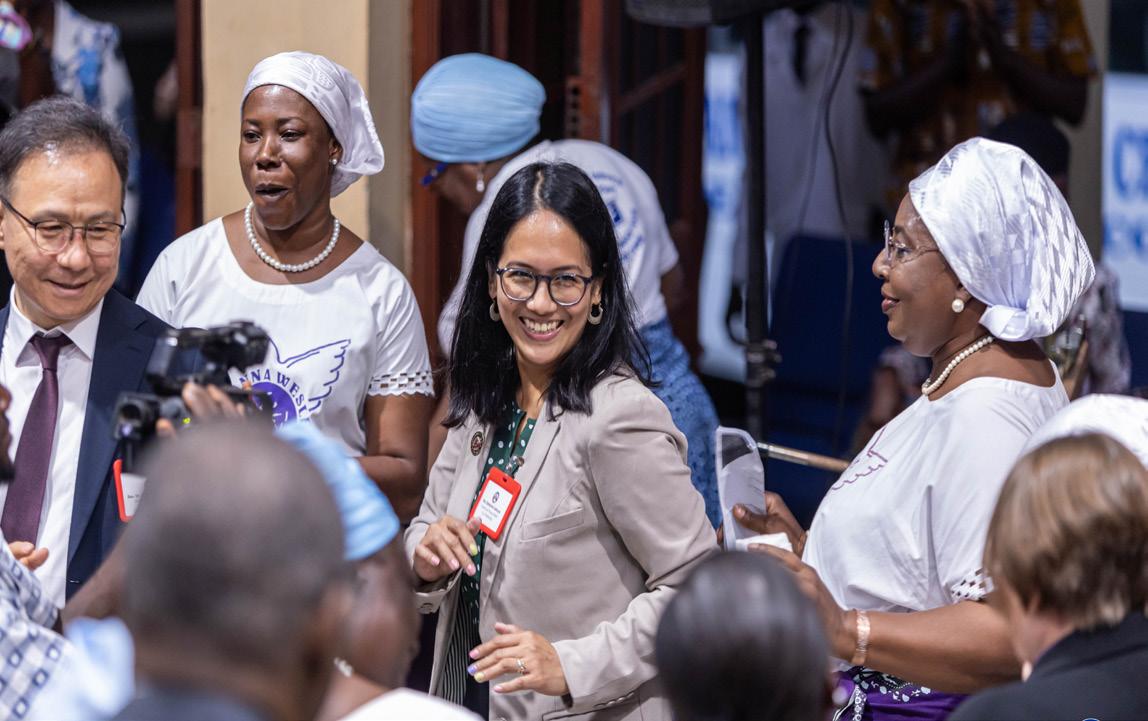
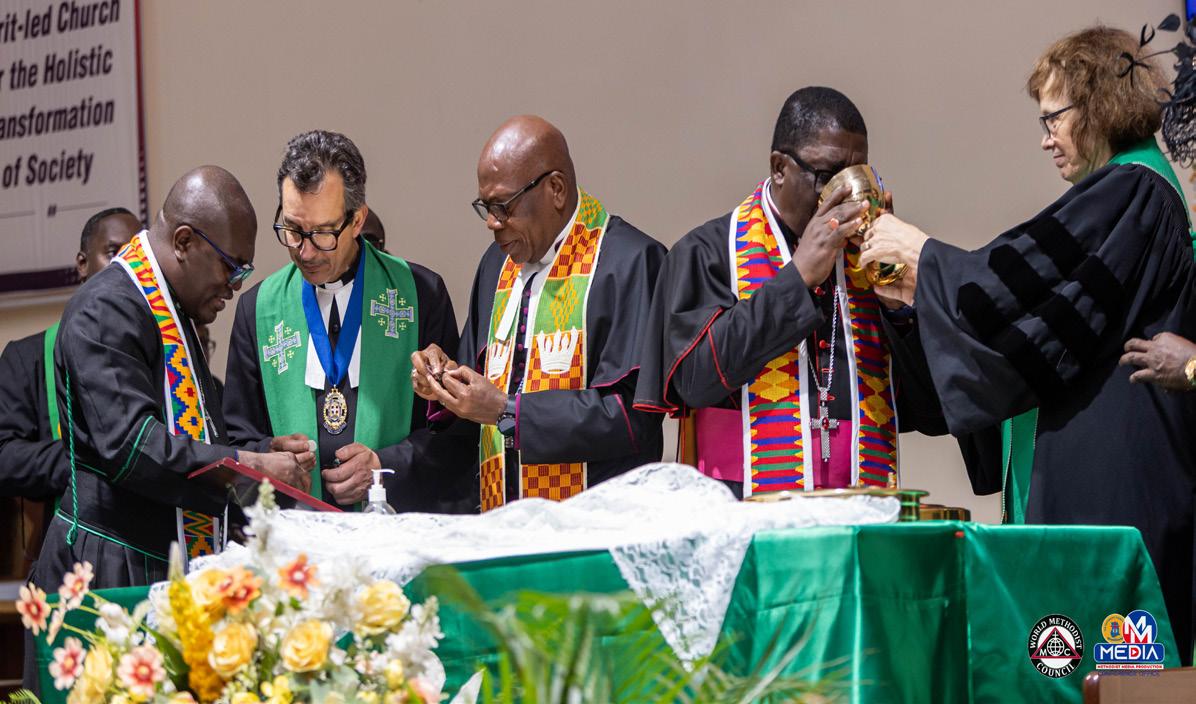
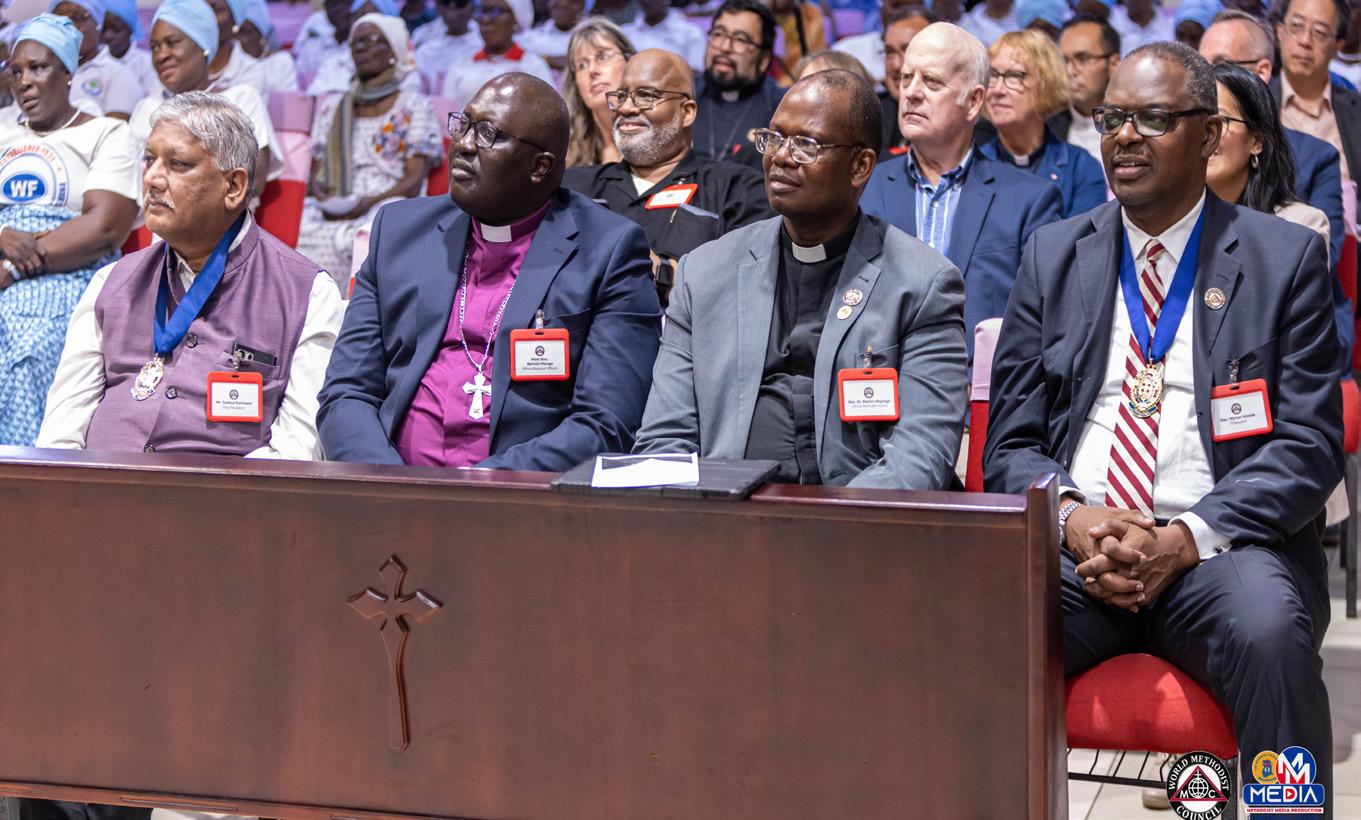
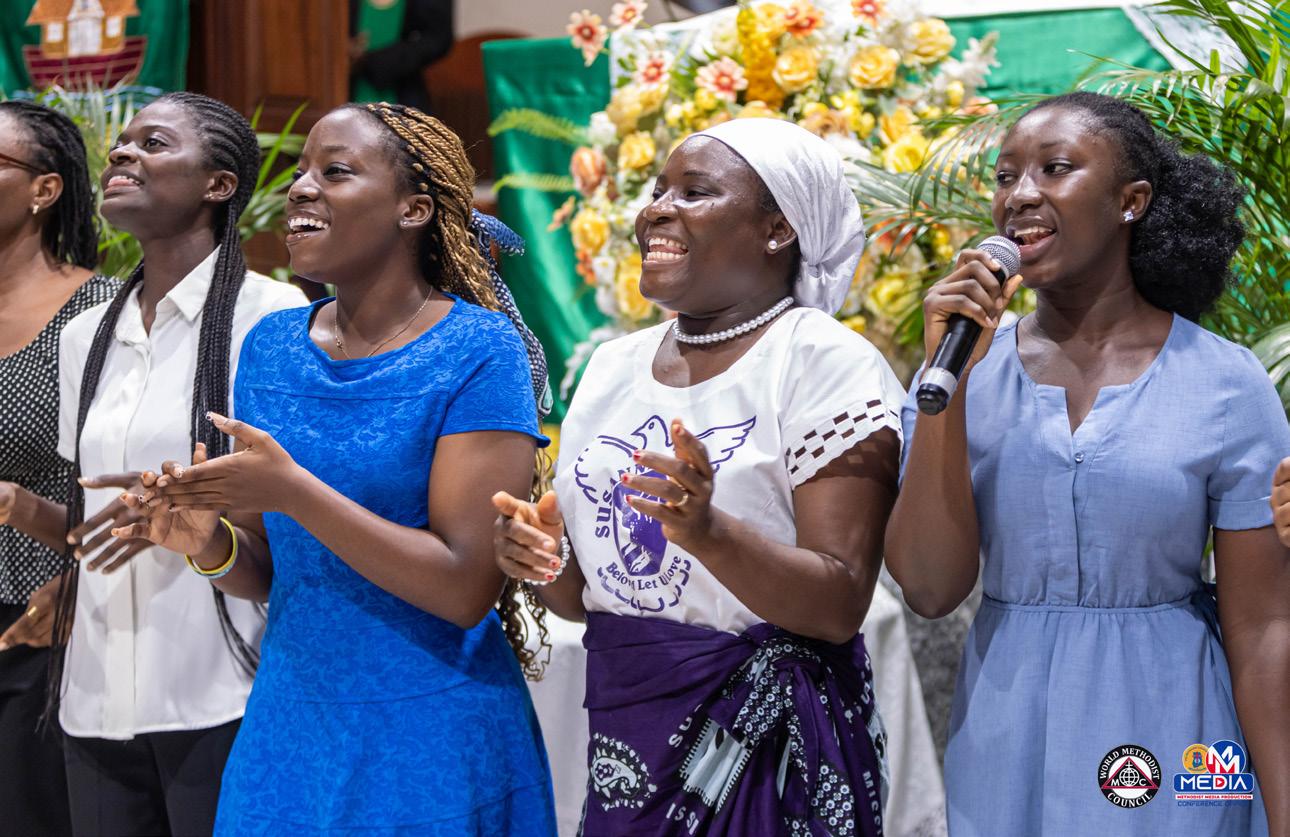
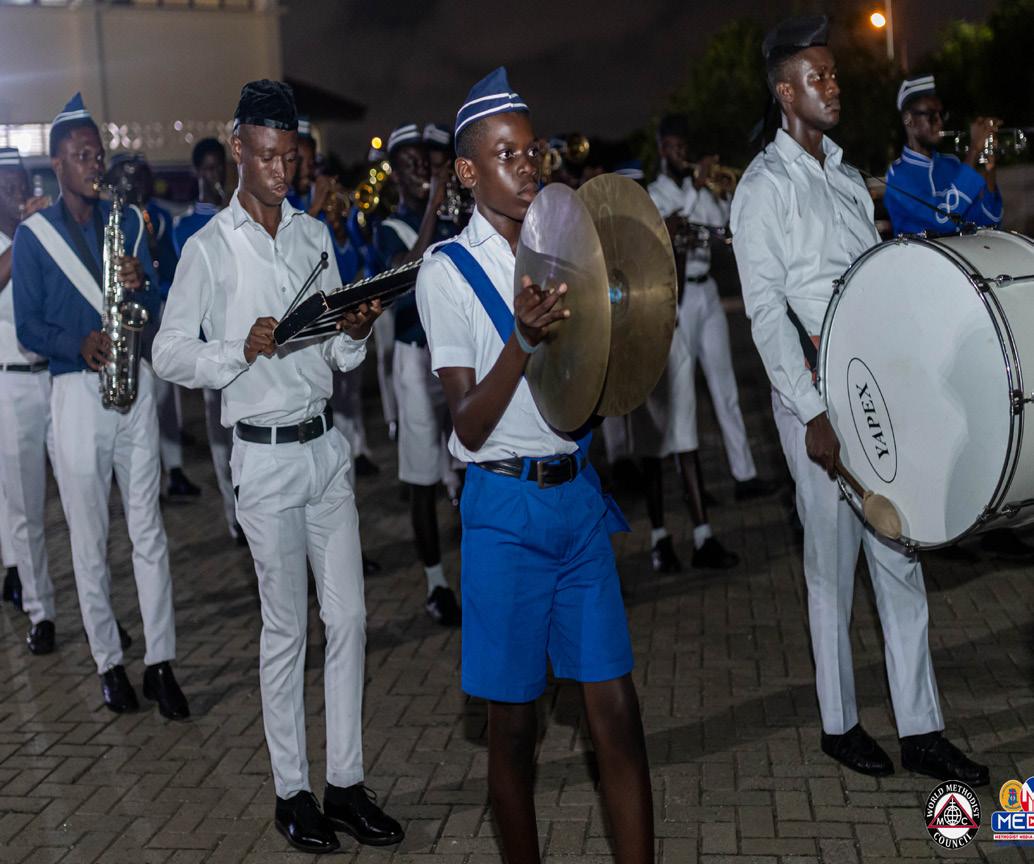
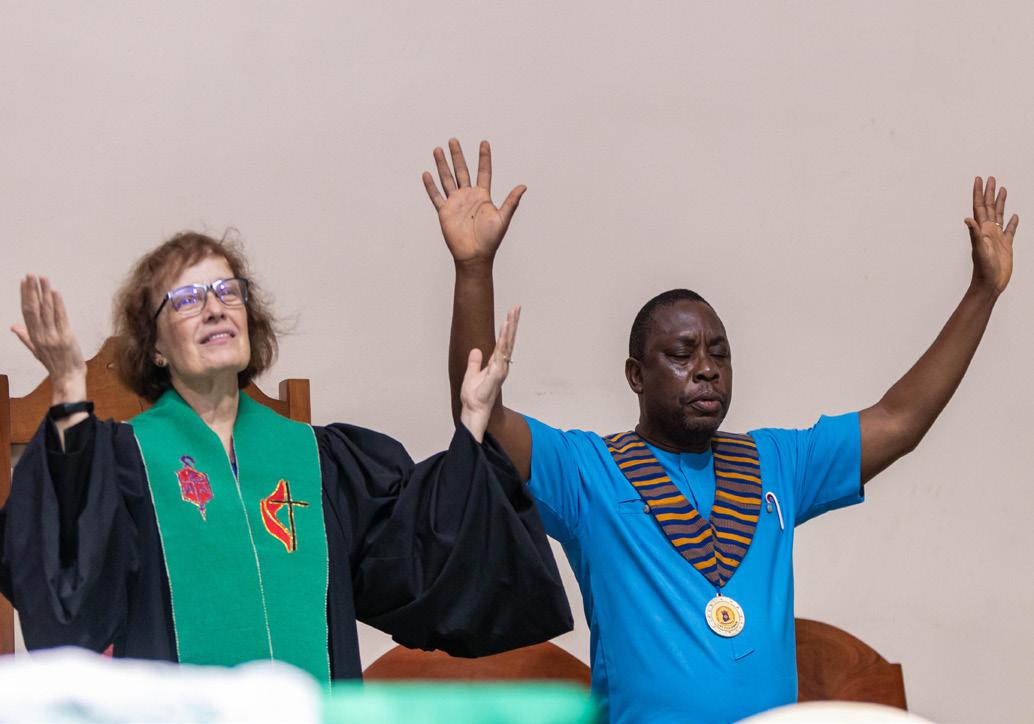
Greenbelt Festival welcomes Rev. Sally Azar
The Methodist Church in Britain recently welcomed Rev Sally Azar, a Lutheran pastor from Jerusalem, as a guest at the Greenbelt Festival in the UK (https://www.greenbelt.org.uk/). This was facilitated by Rev David Hardman, Officer of the Methodist Liaison Office in Jerusalem-WMC is one of the stakeholders. David interviews Sally in the video: Hope in the Making
Greenbelt is a long-standing Christian festival that has been running for over 50 years. It brings together music, performance, art, activism, and faith. For many years, the festival has provided a platform for Palestinian voices, helping attendees engage more deeply with the realities of life in the Holy Land.
During the festival, Sally took part in several sessions. She hosted an online interview with Daoud Nassar—recipient of the 2017 World Methodist Peace Award and founder of the Tent of Nations farm in Bethlehem—participated in Sunday morning communion, and joined a panel discussion titled Decolonising Pilgrimage.
Near the main stage stood a striking replica of the Gaza Lighthouse (The Gaza Lighthouse - Greenbelt). Originally built by artist Shareef Sarhan in Gaza City from the rubble of the 2012 Israeli bombardment, the lighthouse symbolized resistance and resilience. Though the original structure was later destroyed—like much of Gaza since October 2023—Sarhan recreated it for Greenbelt. Sally participated in the lighting ceremony that marked the beginning of the festival. The lighthouse remained illuminated throughout, serving as a powerful symbol of creativity and hope amid destruction.
In addition to her contributions, Sally also explored the festival’s rich offerings of talks, theatre, and music. Her reflections on the experience can be found in the video linked above.
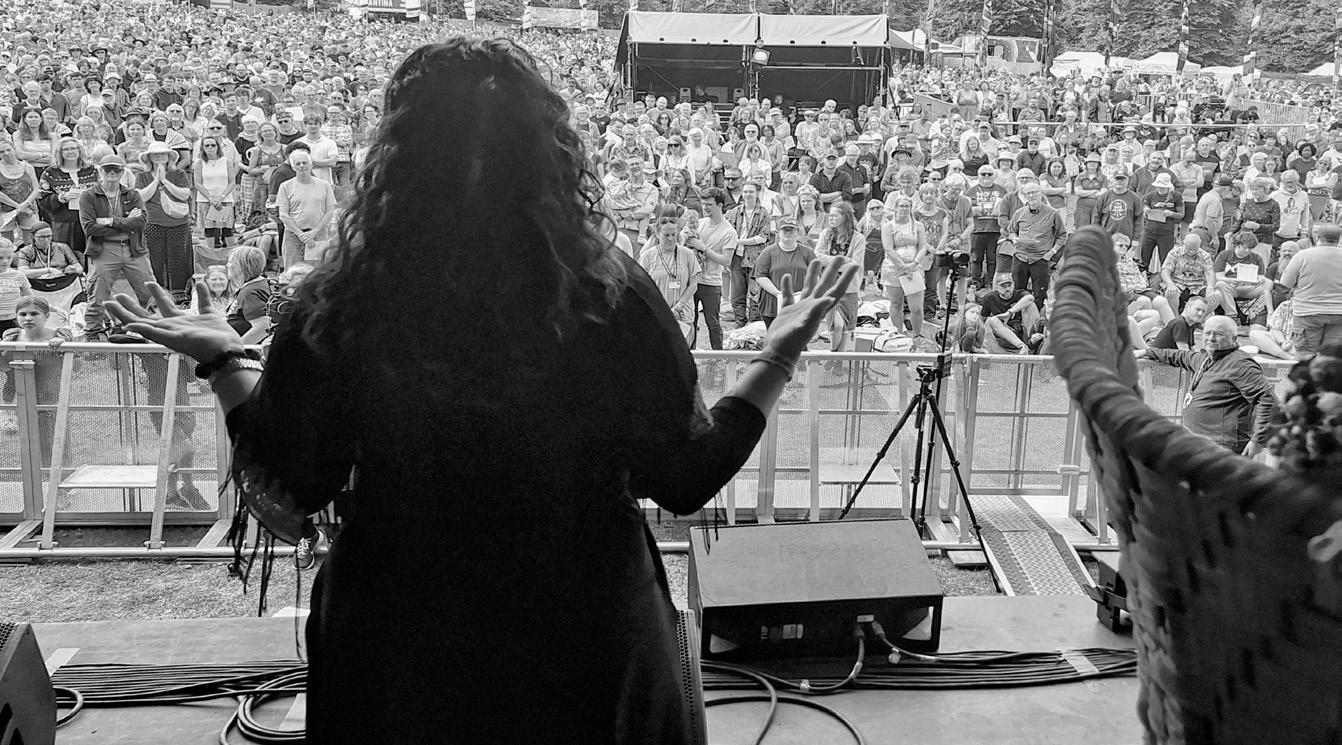
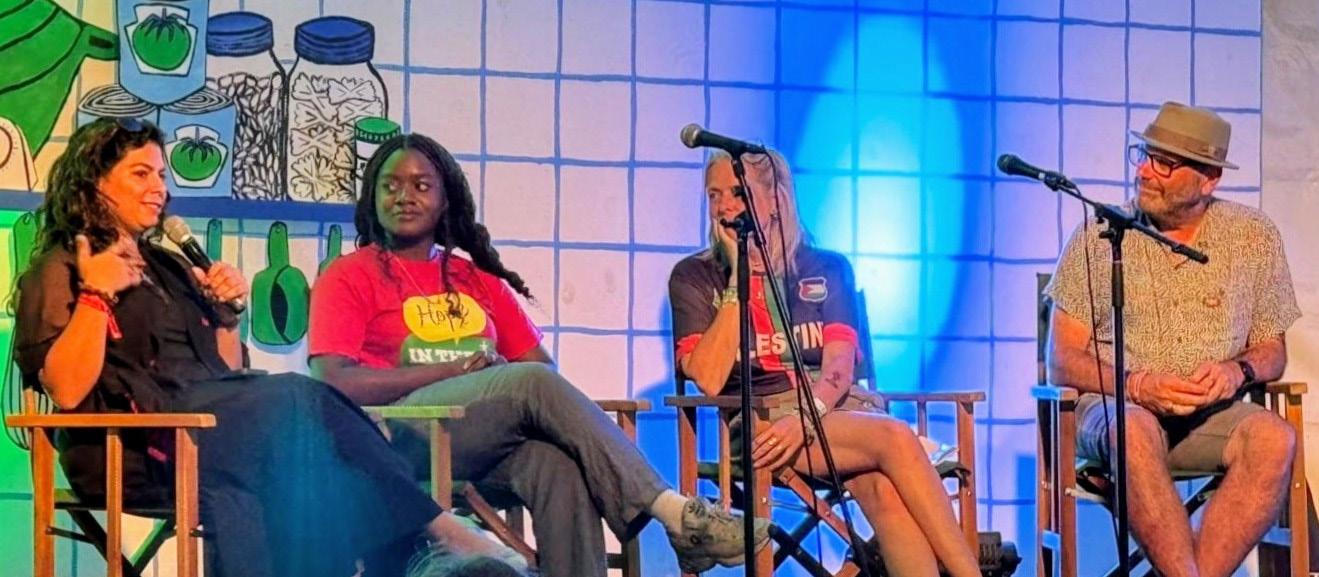
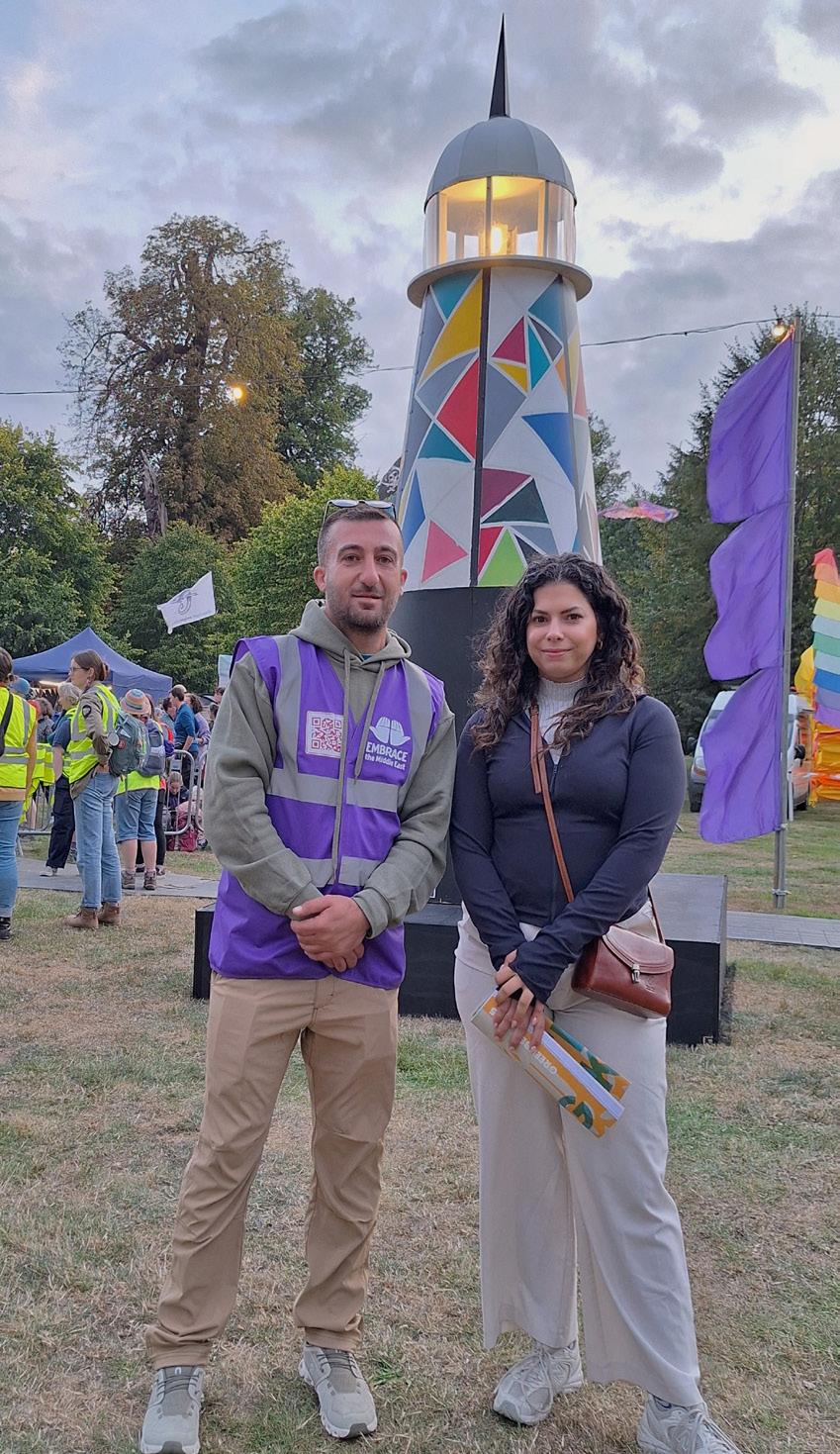
Webinar of World Council of Churches (WCC) and World Methodist Council (WMC)
WCC Faith and Order Commission, in collaboration with Christian World Communions, is organizing a series of webinars to explore key theological, ecclesiological, and missional questions relevant to contemporary Christian unity on the journey to the 6th Faith and Order World Conference in Egypt. September 29th, 2025 at 2 pm to 3:30 pm CEST (Central European Summer Time), the WMC will be partnering with the WCC in a webinar on the theme: “’We believe in God, Maker of Heaven and Earth…’ –Confessing, Celebrating and Working together as Members in God’s Household”.
As we celebrate the season of creation and enter the Ecumenical Decade on Climate Justice Action, panelists will share theological insights from Wesleyan theology and experiences of marginalized communities that can transform worship and Christian discipleship as we are called to be co-workers in God’s new creation. Panelists will include Prof Daniel Bruno, Universidad del Centro Educativo Latinoamericano (UCEL) Argentina, Te Aroha Rountree, Senior Lecturer in Maori/Moana Studies and President of the Methodist Church New Zealand, and Jerusha Matsen Neal, Duke Divinity School, Durham, NC, USA, Baptist Church, joint by a member of the WCC Faith and Order Commission, Dr Mercy Ah Siu Maliko from Samoa (tbc).
Please register here: https://us02web.zoom.us/webinar/register/WN_FLy4fwzIS-C2BgNBN9N6fw
The World Methodist Council Celebrates the 1700th anniversary of the Council of Nicaea: A Wesleyan response to Nicaea: Reflections on Faith, Unity and Mission
Following the series of webinars held during March this year and from different regions of the world (South/North America, Asia/Pacific and Africa/Europe), work has been undertaken to gather and compile the texts of the twelve presentations, along with supplementary material, into a booklet for congregational and group discussion. I am delighted to say that this painstaking work is now complete, and the end result is now on the website of the World Methodist Council. Use the link below.
The wide range of views and perspectives on the Council of Nicaea, and on the Nicene-Constantinopolitan Creed which would eventually emerge, is both fascinating and thought-provoking. So too are the contexts – historical, geographical and ecclesial – in which the Creed is, or is not, used by the people called Methodist. There are significant challenges to pre-conceived notions some of us may hold on matters like missionary endeavour, ecumenical relations and different expressions of spirituality.
As you read and reflect on this material, whether on your own or with a group, prepare to be surprised, provoked and enlightened!
As Chair of the planning group for the World Methodist Council’s response to Nicaea 1700, I would like to express heart-felt thanks to all who took part in this series, whether as speakers, moderators, ‘techies’ or in other ways. In particular, a debt of thanks is owed to Bishop Rosemarie Wenner for her indefatigable work in preparing the texts for publication.
As we say in Irish, ‘Go raibh mile maith agaibh go leir’thank you all very much!
Gillian Kingston
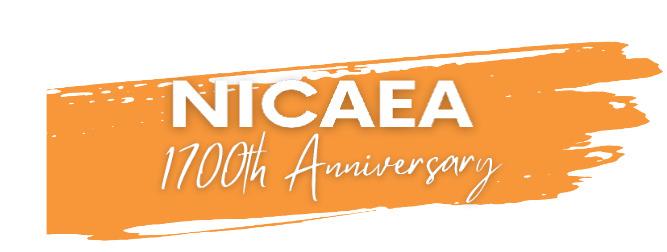
Immediate Vice President of the World Methodist Council Click here to view the Booklet!
Global Faith Leaders explored Economy of Life at NIFEA GEM School
Every year in August, the New International and Financial Architecture (NIFEA) initiative organizes a training for church leaders to explore models of governance, economics and management to transform current unjust systems of inequality and exploitation of people and planet towards an economy of life. Bishop Rosemarie Wenner serves as the Methodist member of the staff team for the training. This year, NIFEA GEM School was hosted from August 17th -30th in Kwanglim Seminar House in Pocheon-si near Seoul in South Korea. GEM School participants from 18 countries and many denominations developed projects such as “Balance the Burden-Towards just Taxation in Barbados”, “Jubilee Campaign – Worship Resources for a Jubilee Sunday”, or “Racing a Generation for an Economy of Life”. This time, Methodists were the biggest confessional group, although an applicant from DRC did not receive her visa. GEM School was followed by a Consultation on “4th Industrial Revolution and Artificial Intelligence – Impacts on Global Inequality and Faith-rooted responses.”
Ilse Gainsford from the Methodist Church in Southern Africa, currently studying in Pietermaritzburg, shared her experiences: “GEM School and the NIFEA Consultation as two spaces of ecumenical exchange and dialogue were highly stimulating, challenging, thought provoking, educational and fun! I’ve especially loved learning about all the different contexts, denominations, people, countries and faith traditions through the diverse participant group from all over the world, as well as getting a perspective into global economics, finance, ecology, theology, policy and management through Christian faith-based approach.”
After a visit of the group to the National Museum of Korean Democracy in Seoul, WesleyMen President Rev Edgar de Jesus, who attended GEM School, said: “We were immersing ourselves with the pain, struggle and liberation of the Korean people. These are still ongoing realities around the globe, and faith communities are challenged to dismantle global inequality, threat of AI, unjust systems and advocate for God’s Economy of Life.” And Jenna Everston from Duke Divinity School in Durham, USA summarized her learnings as such: “Though saddened from airport goodbyes, I leave GEM school with a heart moved for action and a mind ready to contemplate deeply. During the two weeks steep in prayer, devotion, fellowship, and learning, the aroma of Christ filled the room. I now have collaborative, ecumenical partners around the world with exceptional gifts who want to work together towards creating an economy of life.”
The extraordinary hospitality offered by Kwanglim Church and the Korean Methodist Church enabled participants and lecturers to pray, discern and learn together in an atmosphere of care for one another and the environment.
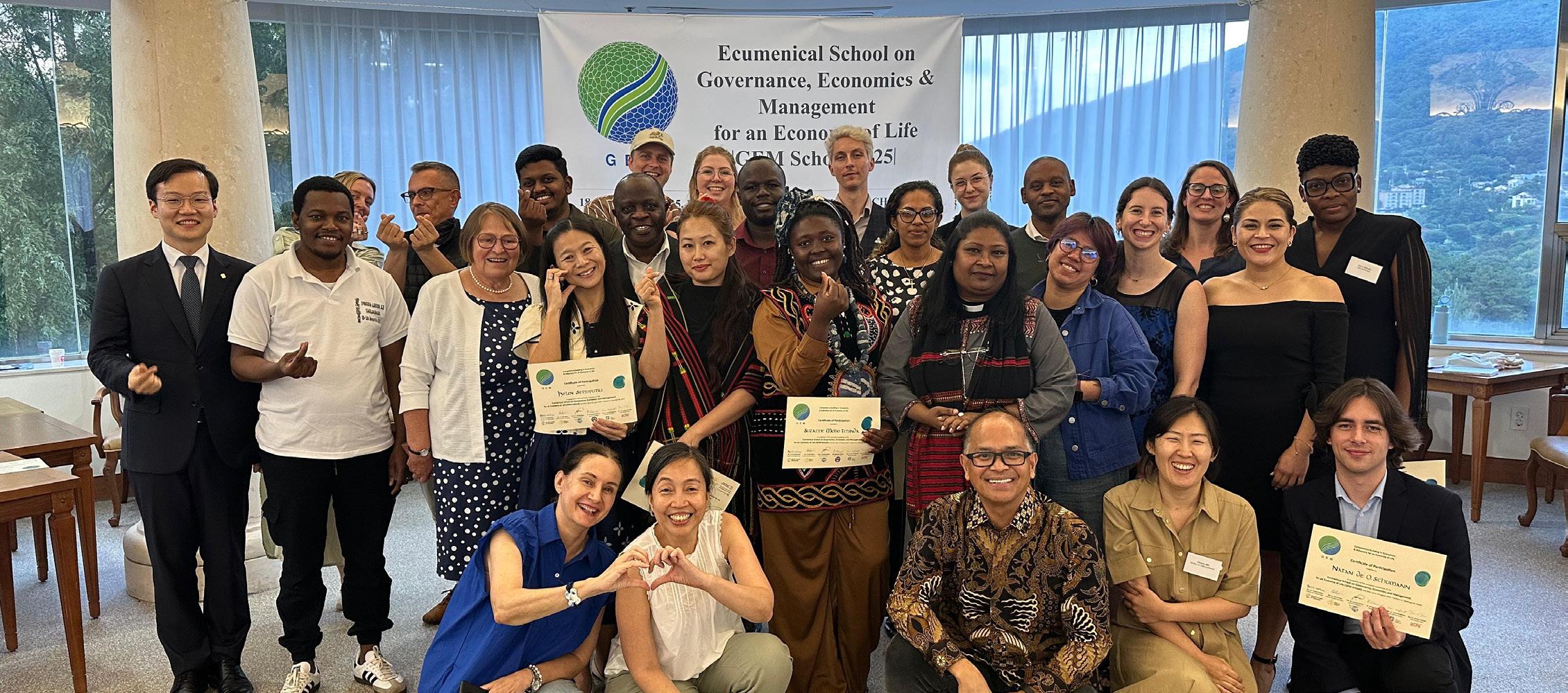
Brazilian Association of Wesleyan Studies Founded
A unique initiative by a collective of scholars and researchers in the Wesleyan tradition, representing various fields of knowledge, founded the Brazilian Association of Wesleyan Studies (ABEW) on August 2, 2025.
Through a process of collaborative reflection, these individuals who research, study, and identify with Wesleyan theology and work in Brazil and other countries in South and North America, Europe, and Africa, decided to formally establish the new organization, whose bylaws were approved at the founding assembly.
This non-profit civil association aims to promote and strengthen Wesleyan studies in Brazil and other countries. It recognizes that the theology developed in 18th-century England by John Wesley, the founder of the Wesleyan movement, which encompasses various denominations, is increasingly relevant worldwide. This theology is expressed through multiple practices, including social movements, interpretations of sacred texts, religious experiences, community service, and inspiring a unique worldview and approach to life.
To this end, ABEW aims to provide those dedicated to Wesleyan studies or seeking inspiration for Christian ministry worldwide with a space for exchanging research and debating ideas, while ensuring academic freedom and freedom of thought. Activities encourage dialogue among the diverse expressions of Wesleyan studies across different continents and fields of knowledge. The organization also engages with other associations, academic institutions, advisory services, publications, events, and courses within its scope of action.
A Board of Directors was elected at the founding assembly and now includes: President, Dr. Helmut Renders; Vice President, Dr. Blanches de Paula; Secretary, Dr. Danilo Prado; Treasurer, Dr. Luis de Souza Cardoso; and Board Members: Dr. Margarida Fátima Souza Ribeiro and Dr. Maruilson Menezes de Souza. This board will meet soon to develop the association’s action plan, which will be shared with the public in due course.
ABEW can be contacted by email at abew.estudoswesleyanos@gmail.com.
For the ABEW board, the association sees it as “a unique opportunity to bring together people dedicated to the dialogue between these traditions and the contemporary world, during a time of profound change, which demands from us every possible effort to understand it better, influence it, and transform it for good, as taught by John Wesley.”
ABEW – Board of Directors (08/07/2025)
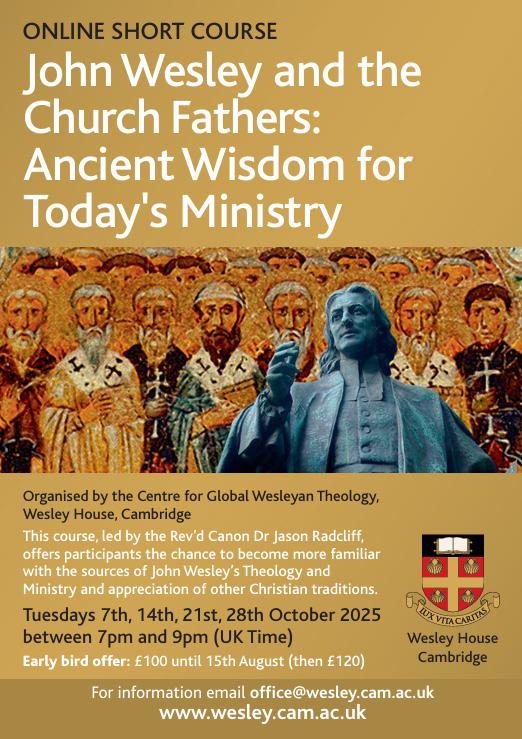
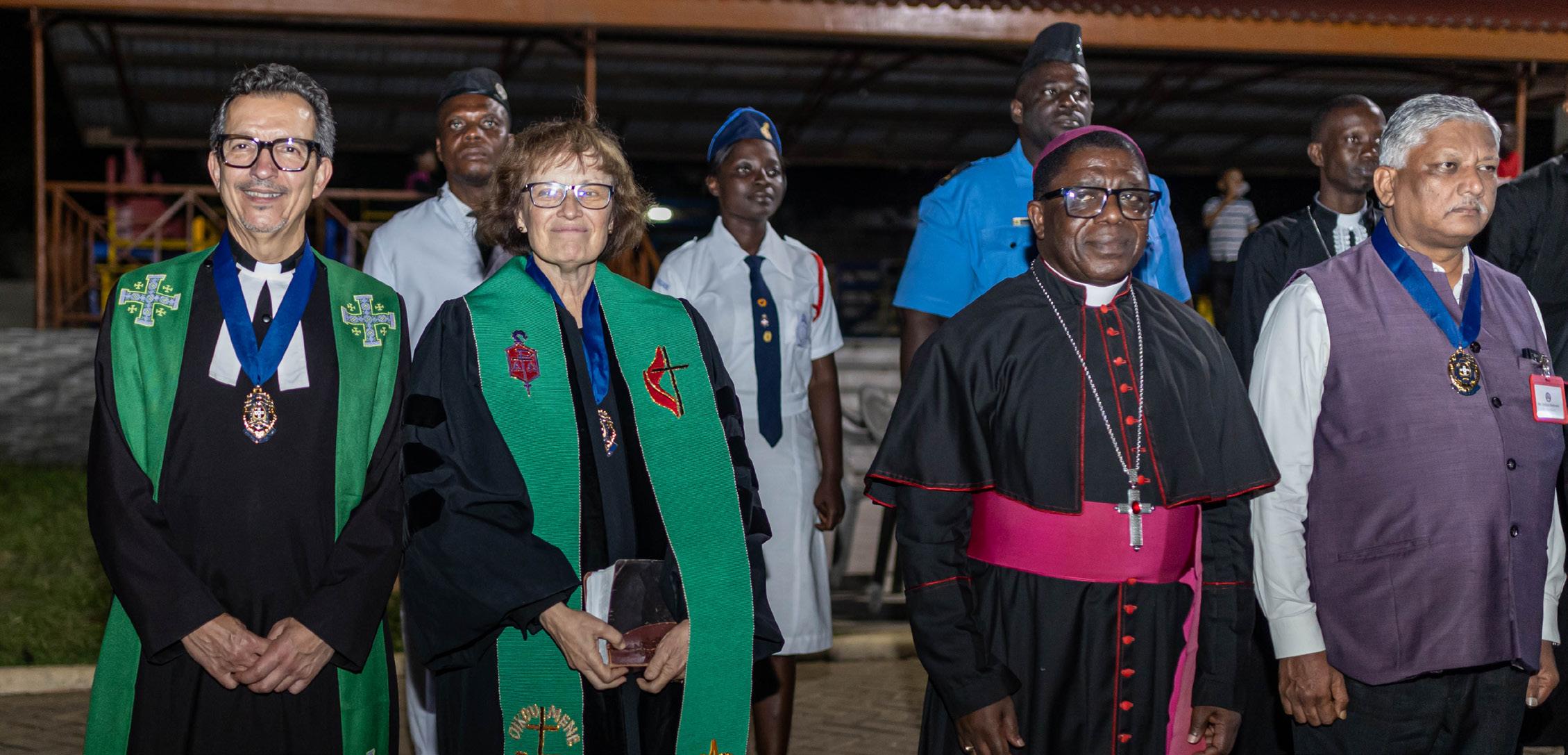
Please send press releases, articles and resources! Submissions should be a page or less (450-500 words), edited and ready to publish. Contact us by Monday, 27 September at communications@worldmethodistcouncil.org if you would like your story to be included in the October edition of the First Friday Letter.
On the Web
This and past First Friday Letters can be found online at FirstFridayLetter.worldmethodistcouncil.org
The World Methodist Council’s website may be found at worldmethodistcouncil.org
About the First Friday Letter
The First Friday Newsletter is a monthly publication of the World Methodist Council.
Publisher: Rev. Dr. Reynaldo F. Leão Neto, General Secretary Communications: Michaela Bryson
To subscribe to this newsletter, please email communications@worldmethodistcouncil.org. Follow the Council on social media!!
All stories and photos, unless otherwise stated, are protected by their respective copyrights. Please do not copy without expressed written permission from the Council.
worldmethodistcouncil
Methodist Council
